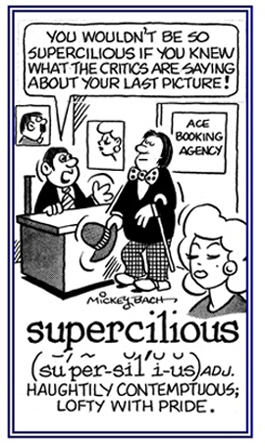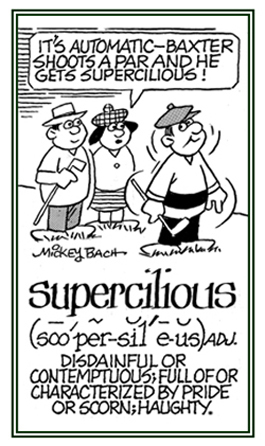super-, supra-, sur-
(Latin: above, over; more than, excessive)
Sur- is a variation of super- developed through the French and shouldn't be confused with another assimilated sur- form that comes from sub- and means: "under, below, beneath".
In some words, super- is amplified to mean: "on top of; higher in rank or position than; superior to; greater in quality, amount, or degree than others of its kind".
2. To process (paper) in a supercalender.
2. Etymology: from super-, "above"; cali-, "beauty"; fragilistic-, "delicate"; expeali-, "to atone"; and docious-, "educable"; with the sum of these parts signifying roughly "Atoning for educability through delicate beauty".
Part of the lyrics of the song Supercalifragilisticexpialidocious, was sung by Julie Andrews.
Even though the sound of it
Is something quite atrocious
If you say it loud enough
You'll always sound precocious
Supercalifragilisticexpialidocious!
2. Etymology: alteration of Spanish sobrecargo, sobre-, "over" + cargo, "goods carried as freight by sea, road, or air".
The carpal bones consist of eight bones arranged in two rows that articulate proximally with the radius and indirectly with the ulna, and distally with the five metacarpal bones; in domestic mammals, the bones of the proximal row are called radial, intermediate, ulnar, and accessory, while those of the distal row are termed first, second, third, and fourth carpal bones.
The cavity (the bubble) reduces the drag on the object and this makes supercavitation an advantageous technology
2. Situated above the firmament, or great vault of heaven.
About one supercentenarian in fifteen lives to 114 years or more. The term has been around from around the 1970s and was further popularized in 1991 by William Strauss and Neil Howe, in their book Generations.
Early references tend to mean simply "someone well over 100" but the 110-and-over cutoff is apparently the accepted criterion by demographers.
2. To force air into an internal-combustion engine at a pressure significantly above the atmospheric pressure at the start of the compression stroke; the degree of pressure retained determines the level of supercharging.
2. A reference to gas or liquid; subjected to pressurization.
3. Full of energy, emotion, tension, etc.
2. A blower or compressor, usually driven by the engine, for supplying air under high pressure to the cylinders of an internal-combustion engine.
2. Having a conspicuous line or marking over the eye, as certain birds.
3. Situated on the frontal bone at the level of the eyebrow.
2. Descriptive of a person's mannerism which shows arrogant superiority to and disdain of those someone views as unworthy: Mark's mother looked at his clothes with a supercilious attitude.
3. Characteristic of someone's behavior which is disdainful or contemptuous and characterized by pride or scorn: Anyone who arches his or her eyebrows and looks down their nose at someone else is showing "a high brow" or supercilious face.
4. Etymology: from Latin super, "above" + cilium, "eyelid".
When someone raises his or her eyebrows, it doesn't necessarily mean that that person is disdainful, contemptuous, etc. Such action may also express surprise, curiosity, etc.



Go to this Word A Day Revisited Index
so you can see more of Mickey Bach's cartoons.
Related "above, over, beyond the normal, excessive" word units: epi-; hyper-; ultra-, ult-.
Inter-related cross references, directly or indirectly, involving word units meaning "more, plentiful, fullness, excessive, over flowing": copi-; exuber-; hyper-; multi-; opulen-; ple-; pleio-; plethor-; poly-; total-; ultra-; undu-.


